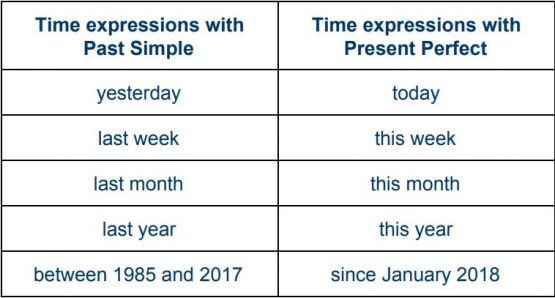Of all the English verb tenses, the present perfect is probably the one that can give you a headache. It’s different uses can certainly be hard to understand and more importantly to put in practice. But there’s good news! If you remember a few simple tricks, you can learn to use it well and confidently! Want to know more? Read on and find out.
Introducing the Present Perfect
The present perfect is a tense that links the past to the presentin some way. That can mean talking about your life experience until now, or describing an action that started in the past and continues in the present, or talking about a recent event that is relevant to now. The key thing is that we never use a finished time with the present perfect (unlike the simple past), such as yesterday, last week, in 1995. Instead we use an unfinished time expression, like today, this week, this year, in your life. Compare the following:

How to make sentences in the Present Perfect
We create the present perfect by using the verb ‘have’ and the past participle of a verb. For example,
“You have been to New York.”
To make questions we invert ‘have’ and the subject:
“Have you been to New York?”
And to make negative forms we add ‘not’:
“You haven’t been to New York.”
The only small variation of this is with the third person singular that requires has instead of have. Here is a table with a complete set of examples:

As you can see, it’s common to contract have to ‘ve, and has to ‘s. The short answer form is Yes, I have/No, I haven’t.
Now let’s look at the three main situations in which we use the Present Perfect.
1) Recent actions
We use the present perfect to describe a recent action or ask if something has happened recently. It’s often used with words likejust, already, yet, still. We often use the present perfect in this case when some action or situation has an effect on the present. For example,
I’ve lost my passport so I can’t get on the plane!
(Finished action in recent past – consequence now.)
Here are some other examples:
Have you finished the report yet?
I haven’t seen Pablo today.
Sally has just gone out.
We’ve already had lunch.
They still haven’t delivered the goods!
2) Life experience
We use the present perfect to talk about things that have or haven’t happened in our lives, without referring to a specific time. We often use ‘ever’ in questions with this use, and ‘never’ in negative sentences. For example,
Have you ever been to Montreal?
No, I’ve never been there.
She’s visited Australia three times!
We’ve never missed a flight fortunately.
Has this team ever won a tournament?
After describing the main life experience with the present perfect, it’s typical to give details with the simple past. For example,
He’s received three important promotions in his career. (present perfect)
The last one was for the position of CEO. (simple past)
3) Unfinished actions
We also use the present perfect to talk about actions or situations that started in the past and continue in the present. To refer to the time the action started we use ‘since’, and to refer to a period of time we use ‘for’. For example,
We’ve lived here for 10 years.
They’ve been married for 25 years.
How long have you worked for this company?
It hasn’t rained for weeks.
You’ve had that car for ages.
Compare the following:

How to know when to use the present perfect or the past simple
When you need to choose between using the present perfect and the past simple, ask yourself these questions:
- Is the action finished?
NO Use the present perfect.
YES Ask yourself the next question.
- Is there a finished time expression?
YES Use the simple past.
NO Use the present perfect.
As you can see, once you understand and remember these key facts about the present perfect, it’s easier to use than you previously thought. Practice is essential of course, and above all practice through speaking.
At Wall Street English you learn the different uses of the present perfect in different lessons and even at different levels, and in every case you learn to use it naturally through listening and speaking. Find out more about Our English Courses.
Try this fun activity now to practice using the present perfect.